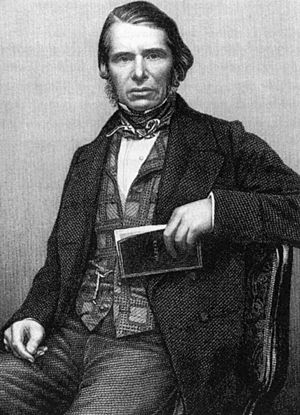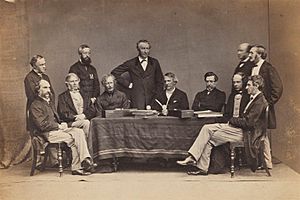Sir Charles Trevelyan, 1st Baronet facts for kids
Quick facts for kids
Charles Trevelyan
|
|
|---|---|

Trevelyan in the 1840s
|
|
| Born | 2 April 1807 |
| Died | 19 June 1886 (aged 79) London, United Kingdom
|
| Nationality | British |
| Alma mater | Charterhouse School |
| Occupation | Civil servant, colonial administrator |
| Spouse(s) |
Hannah More Macaulay
(m. 1834; died 1873)Eleanor Anne
(m. 1875) |
| Parent(s) |
|
Sir Charles Edward Trevelyan, 1st Baronet (born April 2, 1807 – died June 19, 1886) was an important British government worker and administrator in the British Empire. When he was young, he worked for the government in Calcutta, India. Later, he returned to Britain and became the Assistant Secretary to the Treasury.
During his time at the Treasury, he was in charge of the government's efforts to help during the Great Famine in Ireland. Many people believe his actions and beliefs made the famine much worse. He strongly believed in laissez-faire economics, which means the government should not interfere with the economy. This led him to be slow in sending food and money to Ireland. He even wrote that the famine was "the judgement of God" meant to teach the Irish a lesson.
Despite this, Trevelyan also played a key role in making the British Civil Service (government jobs) fairer in the 1850s. He helped create a system where people were hired based on their skills and education, not just their family connections.
Contents
Early Life and Education
Charles Trevelyan came from an old family in Cornwall, England. He was born in Taunton, Somerset. His father, George Trevelyan, was a clergyman. His mother was Harriet Neave. His family's wealth partly came from owning slaves in Grenada.
He went to Blundell's School and Charterhouse School. Then he studied at the East India Company College at Haileybury. Here, he was taught by the economist Thomas Robert Malthus. Malthus believed that populations grow faster than food supplies, leading to poverty. Trevelyan's strong belief in these ideas later affected his decisions during the Irish Famine.
Career in Government

In 1826, Trevelyan joined the East India Company and worked in India. He was very hardworking and intelligent, which helped him get promoted quickly. He held important jobs in different parts of India. He worked to improve the lives of local people, for example, by getting rid of taxes on trade within India. He also strongly supported education for Indians, helping to bring European knowledge and science to them.
In 1840, he returned to Britain and became the Assistant Secretary to HM Treasury. He held this job for 19 years. This period included the Great Famine (1845–1851) and a similar famine in the Scottish Highlands (1846–1857).
Role in the Irish Famine
During the Irish Famine, about one million people died from starvation and disease. Another two million left Ireland. Trevelyan was in charge of the relief efforts. He believed that the government should not interfere too much. He thought that if the government gave too much help, the Irish people would become lazy and dependent.
In 1846, he ordered the government's food relief programs to be stopped. He believed that people should work for their food. He introduced the Labour Rate Act, which gave aid only to the worst-hit areas. This act was slow to start, and many people died while waiting for help.
Trevelyan also wrote letters expressing harsh views about the Irish people. He said the famine was "the judgement of God" to fix what he saw as "the deep and inveterate root of social evil" in Ireland. He blamed Irish landlords for the problems, even though large amounts of food like oats and grain were being shipped from Ireland to England under armed guard while people starved.
Contrast with Scottish Famine
Interestingly, Trevelyan had a different attitude towards the famine in Scotland. He wrote that "the people must not, under any circumstances, be allowed to starve." This shows a clear difference in how he viewed the two situations.
In 1851, he helped create the Highland and Island Emigration Society. This group helped nearly 5,000 Scottish people move to Australia between 1851 and 1858.
Civil Service Reform
In 1853, Trevelyan helped create a new system for hiring people in government jobs. This system, called the Northcote–Trevelyan Report, suggested that people should be hired based on their skills and education, not on their family connections. This was a big step towards creating the modern British Civil Service, which aims to be fair and efficient.
Return to India
Trevelyan returned to India in 1859 as the Governor of Madras (now Chennai). He was popular there and introduced many reforms. He improved the police system and allowed people to buy land more easily.
However, he was recalled to Britain in 1860. This happened because he openly disagreed with a new tax plan proposed by the central government in India. His actions were seen as undermining authority.
In 1862, he went back to India again, this time as the Finance Minister. He made important changes to how the government was run and started many public works projects to develop India's natural resources.
Family Life
Charles Trevelyan was married twice.
- First, in 1834, he married Hannah More Macaulay in India. She was the sister of Lord Macaulay, a close friend of Trevelyan. They had one son:
- Sir George Otto Trevelyan, 2nd Baronet (1838–1928), who became a statesman.
- Second, in 1875, he married Eleanor Anne Campbell.
Legacy and Honors
Trevelyan received several honors for his work. He was made a Knight Commander of the Order of the Bath in 1848. In 1874, he was given the title of the first Trevelyan baronet, of Wallington.
When his cousin, Walter Calverley Trevelyan, died without children in 1879, Charles inherited his large estate at Wallington Hall. This greatly increased his family's wealth and social standing.
In Popular Culture
Charles Trevelyan's character and actions have appeared in books and songs:
- The writer Anthony Trollope said that Trevelyan was the inspiration for the character Sir Gregory Hardlines in his novel The Three Clerks (1858).
- Charles Dickens might have based the character Tite Barnacle in his novel Little Dorrit on Trevelyan. Barnacle works in a slow, inefficient government office.
- The Irish-American band Black 47 mentions Trevelyan in their song "Fire of Freedom," blaming him and others for the famine.
- The popular Irish folk song "The Fields of Athenry" also refers to Trevelyan. It tells the story of a man who stole "Trevelyan's corn" (grain) to feed his starving family during the famine. Because of his policies, many Irish people remember Trevelyan as a very unpopular figure in their history.
Images for kids
See also
 In Spanish: Charles Trevelyan para niños
In Spanish: Charles Trevelyan para niños
 | Shirley Ann Jackson |
 | Garett Morgan |
 | J. Ernest Wilkins Jr. |
 | Elijah McCoy |



